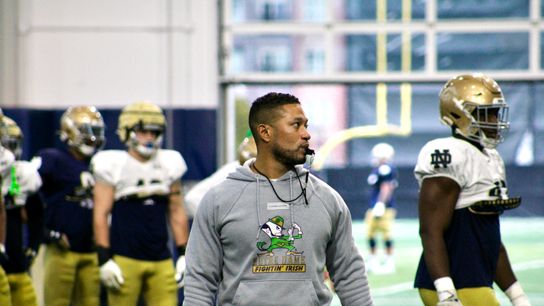College athletes are going to get paid.
A lot. Soon. How soon? There's some debate. But paid, directly by their colleges and universities and as part of an overall settlement worth $2.75 billion.
The full particulars are still being ironed out in the aftermath of the landmark settlements the NCAA, as well as college athletics' power leagues, agreed to in late May that brought to an end the litigation portions of the House v. NCAA, Hubbard v. NCAA and Carter v. NCAA; all cases challenged the NCAA and its member bodies from limiting student-athlete compensation.
Payments could begin roughly midway through 2025; some sources who spoken in the past two weeks to FootballScoop believe the payments to athletes may initiate much sooner.
Regardless, Notre Dame coach Marcus Freeman leaned into the revenue-sharing model for athletes and proclaimed that the Fighting Irish stand ready.
"I think it’s really good for our players," Freeman said of the overall framework around the NCAA settlement in a recent meeting with reporters. "I’m a believer in it, and that’s the general idea, right?
"Should players be able to make money based off their name, image and likeness? Yeah. Yes."
Freeman emphasized that no one, not at Notre Dame or elsewhere in college athletics, knows precisely how the money will be distributed in the future, but he also revealed he's been in constant communication with first-year Irish athletics director Pete Bevacqua.
"There’s still so many open-ended avenues in to how this is going to happen," Freeman said. "That’s been my constant communication with Pete, with everybody I’ve talked to about this is that we can’t all of a sudden start making decisions based off things, the decision hasn’t been made by the Supreme Court. The courts haven’t said this is the final ruling."
Per the formal announcement on the settlement May 23:
"In the first year of the settlement, each school can share 22% of the average Power 5 school’s revenues, which is currently projected to be significantly more than $20 million per school, per year. These new payments and benefits come in addition to scholarships, third-party NIL payments, health care and other benefits that college athletes already receive, and schools can choose to make the new payments and benefits to athletes playing any Division I sport.
"The settlement also eliminates NCAA scholarship caps to open the door to more opportunities for Division I athletes across every sport."
Discussions are ongoing about roster sizes, particularly as it pertains to football and the possibly that walk-on programs could be eliminated as an inevitable cost-cutting measure, which sources shared with FootballScoop almost certainly would include male sports as the settlement disbursements begin and schools grapple with new economic realities.
Freeman, a supporter of the walk-on programs in general and specifically at Notre Dame, said his message to players is to keep the main thing the main thing: better football players make more money.
He also said Notre Dame players would be as well-compensated as anywhere in college athletics.
"Are players going to get paid? Yes. How they get paid? Still to be determined," said Freeman, who specifically has embraced Notre Dame's storied 'W.O.P.U. Nation' walk-on program. "How much they get paid? Still to be determined.
"I still in my heart of hearts believe you’re going to get paid based on how good of a football player you are. And that’s my message to them. It’s no different than now, you’re making money off your name, image and likeness based on how good of a player you are. So, continue to focus on that. You’re going to get paid just as well at Notre Dame as anywhere else in the country. We’re going to be great; we’re in a great situation here. I couldn’t be more excited for our athletic program will be amongst sports, college athletics programs."
He doubled-down on the message.
"But, players shouldn’t focus on how much you’re getting paid; just keep being a great player," said Freeman, 19-8 through his first 27 games at the Irish helm. "You’re going to get paid as well at Notre Dame as anywhere else in the country."
